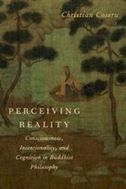Perceiving Reality: Consciousness, Intentionality, and Cognition in Buddhist Philosophy
Publisher:
Oxford University Press USA
Publication:
10/2012
Languages:
English
Binding:
Hardcover
ISBN/SKU:
9780199843381
Pages:
352
Sizes:
235 x 156mm
Weight:
0.7000
On OrderTo be dispatched within 1 week
£45.00
£45.00
(€50.40)
Combining insights from Buddhist phenomenology and epistemology, but also drawing on the work of Husserl, Merleau-Ponty, and recent work in analytic philosophy of mind and phenomenology, Coseru defends the view that perception is a direct mode of apprehension that is intentionally constituted and, under certain circumstances, represents a type of implicit knowing that precludes the possibility of error.
The book's main focus is a range of arguments advanced by two prominent Buddhist philosophers, Santaraksita and Kamalasila, in defending the role that a particular understanding of the structure of awareness must play in settling epistemological disputes. What is significant about these arguments is that they provide a model for integrating the phenomenological and cognitive psychological concerns of Abhidharma traditions within the dialogical-disputational context of Buddhist epistemology. Taking as point of departure the classic debate between Buddhists philosophers and their opponents, Perceiving Reality examines the function of perception as a source of knowledge and its relation to language and discursive thought, and provides new ways of conceptualizing the Buddhist defense of the reflexivity thesis of consciousness - namely, that each cognitive event is to be understood as involving a pre-reflective implicit awareness of its own occurrence.
Coseru advances an innovative approach to Buddhist philosophy of mind in the form of phenomenological naturalism, and moves beyond comparative approaches to philosophy by emphasizing the continuity of concerns between Buddhist and Western philosophical accounts of the nature of perceptual content and the character of perceptual consciousness.
Readership: Philosophers; scholars of Indian Buddhism and philosophy; researchers in the sciences of the mind with an interest in non-Western perspectives.
The book's main focus is a range of arguments advanced by two prominent Buddhist philosophers, Santaraksita and Kamalasila, in defending the role that a particular understanding of the structure of awareness must play in settling epistemological disputes. What is significant about these arguments is that they provide a model for integrating the phenomenological and cognitive psychological concerns of Abhidharma traditions within the dialogical-disputational context of Buddhist epistemology. Taking as point of departure the classic debate between Buddhists philosophers and their opponents, Perceiving Reality examines the function of perception as a source of knowledge and its relation to language and discursive thought, and provides new ways of conceptualizing the Buddhist defense of the reflexivity thesis of consciousness - namely, that each cognitive event is to be understood as involving a pre-reflective implicit awareness of its own occurrence.
Coseru advances an innovative approach to Buddhist philosophy of mind in the form of phenomenological naturalism, and moves beyond comparative approaches to philosophy by emphasizing the continuity of concerns between Buddhist and Western philosophical accounts of the nature of perceptual content and the character of perceptual consciousness.
Readership: Philosophers; scholars of Indian Buddhism and philosophy; researchers in the sciences of the mind with an interest in non-Western perspectives.




